Breakfast Clubs are completely FREE…. And will always remain free!
NO Fees, NO subs, NO dress code and we are NOT here to make money for any organisation/business.
Original Breakfast Club Values
We run the CIC with the "Original Breakfast Club Values" run "By Veterans For Veterans".
The CIC is the umbrella organisation for the Breakfast Clubs with no fees or sub's paid, funds raised will go back into the veteran's community.
All funds are fully accountable and no person has sole access to any funds, we are set up correctly so it takes more than one signature to withdraw any funds. Since the Armed Forces Veterans Breakfast Club (AFVBC) is run By Veterans For Veterans the costs are small, so more funds can go back to helping veterans.
The CIC is run by veterans and in line with CIC Regulations which includes asset lock rules.
There are no "official" or "unofficial" Breakfast Clubs since they are run autonomously which is one of the fundamental principles. Breakfast Clubs are here to help Veterans gain the help/support they require. (This is contrary to what other people/organizations are stating). If being the only Armed Forces & Veterans Breakfast Club (AFVBC) listed on the Government website for supporting Veterans, recognised by the Armed Forces Covenant, recognised by the Royal British Legion, and more makes an organisation "official" then we are the official Armed Forces & Veterans Breakfast Clubs (AFVBC).
Armed Forces Veterans Breakfast Clubs Welfare Aims.
Armed Forces Veterans Breakfast Clubs (AFVBCs) are informal, community-based organisations that provide a supportive and welcoming environment for veterans of the armed forces. These clubs aim to address the welfare needs of veterans through a variety of activities and initiatives. The welfare aims of AFVBCs include:
- Social Connection: AFVBCs seek to alleviate feelings of isolation and provide veterans with a sense of belonging. They offer a social setting where veterans can meet, bond, and share their military experiences, fostering camaraderie and a sense of unity.
- Peer Support: These clubs encourage open and non-judgmental discussions among veterans about their experiences, challenges, and concerns. Peer support is an essential element in helping veterans cope with the unique issues they may face, such as post-traumatic stress disorder (PTSD) and the transition to civilian life.
- Mental Health and Well-being: AFVBCs recognise the importance of mental health for veterans and work to create an atmosphere where veterans can discuss mental health issues openly. They may also provide information about mental health resources and encourage veterans to seek professional assistance if needed.
- Assistance with Benefits and Services: Many veterans are entitled to various benefits and services from government agencies and non-profit organizations. AFVBCs often help veterans understand and navigate these systems, ensuring they receive the support they are entitled to, such as healthcare, disability compensation, and educational benefits.
- Information Sharing: These clubs serve as a valuable source of information, sharing updates on resources, events, and opportunities that are relevant to veterans. This may include job fairs, educational programs, legal assistance, and other pertinent information.
- Charitable Activities: Some AFVBCs engage in fundraising and charitable activities to support veterans in need. They may raise funds to assist veterans experiencing financial hardship or donate to local veterans' charities.
- Community Engagement: AFVBCs aim to connect with their local communities and create awareness about veterans' needs and contributions. Engaging with the public helps bridge the gap between veterans and non-veterans and build a supportive network.
- Advocacy: In some cases, AFVBCs may advocate for policy changes or improvements related to veterans' issues. They may work with local, state, or national organisations to raise awareness and address the challenges faced by veterans.
It's important to understand that the specific welfare aims and activities of each Armed Forces Veterans Breakfast Club can vary based on the club's location, leadership, and the needs and preferences of its members. These clubs play a vital role in providing support and a sense of community to veterans while also contributing to the overall well-being and integration of veterans into civilian life, these clubs are run with the welfare of veterans as their number one priority, making sure veterans are signposted to the right help which meets their requirements and needs.
The support offered can be access by a simple telephone call or email, and it will be answered as soon as possible because no one likes waiting around when the support or information is needed straight away.
Social Media Groups
Social Media Groups are run by their members/admins, no person other than those who attend the club should be an admin (unless otherwise asked to be).
Social Media Banners can be anything, it does not have to be the default banner we provide.
How the Social Media Group/Breakfast Club is run, is up to its members/admins. There should be no interference from anyone who does not attend the Breakfast Club.
The CIC is here to advertise and help when and if needed to point veterans to their nearest club or further help when and if required.
Armed Forces & Veterans Breakfast Clubs Notice
We are in no way associated with any other organisation with a similar name. We have not and will not carry any orders which have been placed with other organisations. Their suppliers have their own reasons for refusing to provide a service to them, and that is and has nothing to do with this organsation (Company No. 11161286).
Having heard from the Intellectual Property Office (IPO), they have confirmed that the ARMED FORCES & VETERANS BREAKFAST CLUBS (AFVBC) Logo/Trademark was transferred in the correct manner, with the full knowledge of the Director (Company No. 10251007). There was no criminal offense committed during the process of transferring the Logo and the appeal (by the Director, Company No. 10251007) for the Logo rectification has been dismissed. Humberside Police closed the case in August 2019, when they found that there was no evidence or any crime had been committed.
The court case which took place found it was Company No. 10251007 which owed the funds and not the director, and as the aim of our organisation it to help veterans then it would be wrong to take more funds from that organisation Company No. 10251007 when they have already had to pay our organisation (Company No. 11161286) as the IPO ordered them (Company No. 10251007) to do so in a failed attempt to register yet another trademark.
Also, when the admins of this organisation (Company No. 11161286) left the other organisation (Company No. 10251007) because of financial irregularities they where replaced, but then those admins left because of the same reasons (financial irregularities). We are not linked to the organisation/breakfast club, who had to close their own breakfast club accounts down due to cheques been made payable and no receipts being provided, again this is due to bad management by the other organisation.
"Part of Email from Humberside Police"
"Whilst there is a smokescreen of financial information in the summary emanating from the breakdown of a business which has been poorly run, the offence boils down to an allegation of theft of a trademark. I have discussed the case in length with the OIC and taken advice from the Force legal department. The IPO have documentation from both parties and will make a decision if their procedure has been followed correctly to transfer the Trademark. The complainant has not provided any admissible documentary evidence to support any allegation of theft. The transfer form does not appear to have been tampered with and there is no evidence of fraud."
Intellectual Property Office (IPO) (18/12/2024)
The IPO were asked about any ongoing action to change the ownership of (IPO) our Trademark, and if there are is any current or penging action.
"I haven’t been able to identify any new application to alter the status or ownership of the above registration."
"I have checked the electronic record for trademark number 3177505, and I cannot find any current proceedings recorded against it."
Hull Daily Mail News - https://www.hulldailymail.co.uk/news/hull-east-yorkshire-news/council-call-police-veteran-sending-244581
Trademark Decision - https://www.ipo.gov.uk/t-challenge-decision-results/o49519.pdf
Founder Defends Sex Offender - https://www.pressreader.com/uk/hull-daily-mail/20190723/281625306894971
So, there is no current case ongoing by any organisation, contrary to what information is being published or what people are being told.
What is a CIC?
A Community Interest Company (CIC) is a type of company introduced by the United Kingdom government in 2005 under the Companies (Audit, Investigations and Community Enterprise) Act 2004, designed for social enterprises that want to use their profits and assets for the public good.
A community interest company is a business with primarily social objectives whose surpluses are principally reinvested for that purpose in the business or in the community, rather than being driven by the need to maximise profit for shareholders and owners.
CIC's tackle a wide range of social and environmental issues and operate in all parts of the economy. By using business solutions to achieve public good, it is believed that CIC's have a distinct and valuable role to play in helping create a strong, sustainable, and socially inclusive economy.




